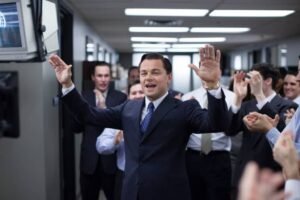Do films about money offer investing truths or are they just Hollywood stories?

Every few years, Hollywood turns money into a movie star. Films with financial themes take center stage and dramatize stock market swings, Wall Street scandals and colorful (albeit greedy) characters.
Many of these movies, such as “The Wolf of Wall Street,” “Dumb Money” and “The Big Short,” purport to show how real events unfolded in financial markets. They try to entertain as well as educate viewers.
But how realistic are they?
“It can be fun to see how Wall Street manages to blow itself up every so often,” said Russ Hackmann, a Boston-based financial adviser. He says these films can serve an instructive purpose by reminding investors to control risk, temper their impulses and diversify their portfolio.
Yet movies also need to tell a compelling story to captivate audiences. This limits their educational impact. “Almost all movies are not a good place to steer people for financial advice,” Hackmann said. “I’ve never seen a movie that shows people quietly saving for the long term. That would be pretty boring to watch.”
Perhaps the least boring financial movie is “The Wolf of Wall Street” 2013), which Hackmann calls a cautionary tale about investment scams. He credits the script for making useful points about picking stocks in a fruitless attempt to beat the market.
In one scene, Matthew McConaughey (playing Mark Hanna, a real-life stockbroker) tells Leonardo DiCaprio (playing Jordan Belfort, another stockbroker), “Nobody knows if a stock is gonna go up, down, sideways or in circles, least of all stockbrokers.”
This reinforces well-established market wisdom that most portfolio managers do not consistently outperform the S&P 500 Index SPX, especially given their funds’ fees that reduce returns over time.
Movies can also reflect societal changes in investor behavior and psychology. In “Dumb Money” (2023), we see how a struggling financial analyst can ignite a national frenzy by harnessing social media to share his views on the market.
“It’s probably more sensationalized compared to real life,” said Omar Qureshi, an adviser in St. Louis, Mo. “But it’s relevant to the psyche of the markets today — the popularization of investing through online platforms where so-called dumb money can band together as a community” to buy a stock such as GameStop and foil hedge fund managers betting on its shares to fall.
While the movie captures the thrill of individual investors — including many first-timers — reaping heady gains, it also shows how volatility wreaks havoc on their emotional wellbeing.
“What it doesn’t show is the tried-and-true [investing] strategy,” Qureshi said. “Maybe 1% of the time, concentrating your bets can lead to wealth. But that’s literally gambling,” whereas diversification and prudent asset allocation powers a more effective and resilient financial plan.
Qureshi also hails “Dumb Money” for alerting audiences to the risk of overleverage. Taking on debt to join the crowd’s surge into a meme stock carries extreme risk. “It’s a good lesson,” he said. “Leverage is a truly double-edged sword.”
Another lesson that movies — and some financially-themed television shows — highlight is how runaway ego can drive faulty investment decisions. If you lack humility and insist that you’re smarter than everyone else, you’re apt to make colossal mistakes.
“The Big Short” shows how a big ego can lead to big money troubles. PARAMOUNT/COURTESY EVERETT COLLECTION
Even more than “Dumb Money,” “The Big Short” (2015) adopts a quasi-documentary format. The script is packed with facts, figures and explanatory information. In a now-famous one-minute monologue in a bubble bath, actress Margot Robbie translates Wall Street jargon into plain English and explains how some traders navigated the subprime mortgage crisis.
“In ‘The Big Short,’ you see a lot of hubris among traders,” said Mike Mussio, a certified financial planner in Bethesda, Md. “It all leads to some type of turmoil. The components of the soup that smell so good on the stove are in the end the things that cause a meltdown.”


